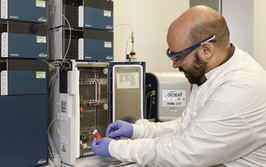The Right to Decide
Let’s not ride roughshod over patient autonomy when it comes to national vaccination campaigns
Nicola Wainwright | | Opinion

In the midst of a pandemic that has changed all of our lives, the focus of the last few months has been on the benefits to society of a vaccine against COVID-19 – and rolling out national vaccination programs as quickly as possible. But in the rush to protect society as a whole, we should not completely ignore the autonomy of patients and the right of each individual to make their own decision about medical treatment, including vaccination.
As a lawyer, I act for patients including those who wish to assert their rights to be involved in decisions about their treatment, in accordance with the right to respect for their private life, as protected by article 8 of the European Convention on Human Rights and as recognized in judgments of the European Court of Human Rights and the Court of England & Wales.
But this is not just about some technical legal right; giving information and having an open discussion about the risks and benefits of medical treatment so that people can make a fully informed decision about what is best for them is an important right we must protect. And doing so will also assist in countering the problem of vaccine hesitancy.
The news that the AstraZeneca (and possibly other) vaccines could be linked to blood clots has led to more people declining the vaccine, emphasizing why patients undergoing vaccination do need to be fully advised of both the risks and the benefits. The concept of “informed consent” is well recognized in law and in medicine. The Courts have made clear that, before giving any form of medical treatment, there should be a dialogue between medical professional and patient. The dialogue aims to ensure that the patient understands the seriousness of his/her condition (or, in the case of COVID-19, the seriousness of the risks involved if he/she is infected), the anticipated benefits and risks of the proposed treatment, and any reasonable alternative treatments, including the option of no treatment.
A vaccination is no different to any other form of medical treatment when it comes to ensuring a patient has given properly informed consent. We must ensure that individuals eligible for the COVID-19 vaccines are given sufficient, easily understandable, and reliable information – if necessary, about the different vaccines available – and an opportunity to discuss their concerns so that they can make a fully informed decision.
There will be some who will not hesitate to have the vaccine; those who have already decided what is best for them and their family, and some will have considered the benefit to society as a whole. It may be that they will not require or want a lengthy discussion, but there are others who will be nervous and scared. Unthinking criticism of those who are hesitant about the vaccine is not helpful – and it misses the point. There are reasons they are hesitant – and those reasons need to be explored. For these concerned individuals, an honest and open discussion will be of considerable benefit. If nothing else, it can help counteract incorrect information obtained during uninformed discussions with friends and relatives, and from the conspiracy theories and scare-mongering that abounds, particularly on social media.
From my work with those who have been injured during medical treatment, I have seen first hand the value of an open and honest discussion with patients and relatives who have questions about the treatment they have received. It makes a real difference to people if they are treated like adults, rather than being “protected” from the truth or it being assumed that “doctor (or in this case government) knows best” in a paternalistic fashion.
COVID-19 raises specific challenges when it comes to giving information because the disease and the treatments available are relatively new, so information regarding effectiveness and risk is emerging all of the time. However, if available evidence of the benefits and harms is unclear then a patient should be told that. Informed consent whilst vaccinating a national population as quickly as possible is challenging, but, in my view, patients’ autonomy and rights must not be forgotten. To ignore them would be a backward step.



















